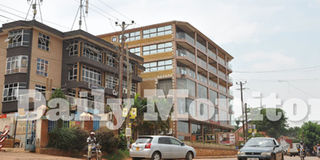Parliament rejects govt plan to raise property tax

Buildings for rent in Kampala. Establishments such as these are subject to property tax which legislators say must be maintained at 1 per cent. FILE PHOTO
What you need to know:
Impact. The legislators say the hike is likely to fuel evasions.
Kampala. Lawmakers have rejected a government proposal to increase stump duty also known as property tax from 1 per cent to 2 per cent, a measure Finance minister Matia Kasaija said was projected to contribute Shs9 billion to the 2016/17 Budget.
Instead of the proposed 2 per cent, the Finance Committee cut it to 1.5 per cent.
However, this was rejected by parliamentarians who argued that such a measure would affect the country’s Growth Domestic Product (GDP), reduce consumption and hit tax collections in the process. Parliament last Thursday started debate on the revenue measures for the 2016/17 Budget.
Paul Mwiru (Jinja Municipality East), Nandala Mafabi (Budadiri West) and Wilfred Niwagaba (Ndorwa West) and Theodore Ssekikubo (Lwemiyaga) also warned that increasing property tax charged on the transfer/sale of property such as land, buildings and vehicles and others will cause problems in the economy and worsen corruption.
“Studies have shown that every year, Shs1.5 trillion is lost in tax exemptions. If we can plug this loophole in the revenue generation, the Shs9b we are talking about is peanuts,” Mr Mafabi said, warning that, “the moment GDP and consumption goes down, tax collection will be negatively affected.”
“This tax is going to affect everybody, but even if we increase the tax, there is no guarantee that everybody is going to pay. People will find ways of dodging this tax because it’s progressive,” Mr Mwiru said, before advising Finance ministry officials to “Go and think outside the box and come up with better ways of expanding the tax base.”
Delving into implications of the proposed tax increase, West Budama North MP Fox Odoi told the House that if stamp duty is increased by 0.5 per cent, there will be 0.1 per cent decline in GDP, 0.9 per cent decline in consumption and a slight decline in unemployment of 0.2 per cent.
However, Mr Stephen Birahwa Mukitale (Buliisa) supported the Committee proposal of 1.5 per cent as “a drive to broaden the domestic tax base” and insisted that “this is a progressive tax.”
Shadow Finance minister Geoffrey Ekanya and Mr Ssekikubo demonstrated how the proposed tax increase will distort the economy and make the transactions informal.
“The proposed tax is boxing us into the colonial regime. Government must think outside the box instead of raising money using colonial era mindset,” Mr Ekanya said.
But according to Mr Mafabi, high taxes are fuelling corruption in the economy as people find smarter ways of dodging them and warned that people will manoeuvre and avoid the tax. “Make it small and make money,” he said.
State minister for Finance (General Duties) Fred Omach tried to appeal to members to accept the proposed tax increase but without success.
The minister informed the House that the government increased the taxes because Ministry of Finance needs money to finance the 2016/17 budget priorities.
“The measure will give us up to Shs9b if we raise stamp duty from 1 per cent to 2 per cent,” Mr Omach said. “We appeal to members to accept the position of the Committee so that we can get at least Shs6b because we want the budget to balance and this is already embedded in the resource envelope.”
Mr Niwagaba, a city lawyer, complicated matters when he told the House that The Stamp Duty (Amendments) Bill, 2016 ,sought to exempt the transfers of property/assets between associated companies but slapped a charge on the transfers between spouses without defining the spouse and the spelling out the burden of proof.
Deputy Attorney General Mwesigwa Rukutana, who confessed on the floor how he had his “personal views” on the proposed government amendments, instead supported Mr Paul Mwiru’s argument that the proposed amendments to the parent law were not consistent with the object of the Bill.
Mr Rukutana said the Bill sought to amend only Schedule II of the Stamp Act and that the wider proposed amendments were not part of schedule II.
He, therefore, proposed that the preamble of the Bill be amended to accommodate the wider proposed amendments.
About the tax
Property tax is the tax payable on either the income arising from the sale or rental of property or on the transfer of property. In the case of transfer of property, the tax is also known as Stamp Duty. It is the duty a purchaser of property pays to the government in order to have the transfer documents “stamped” during the process of transferring the title deeds of that property from the names of the seller to the names of the purchaser and the new owner of the property. The rate of Stamp Duty in Uganda is 1 per cent.




